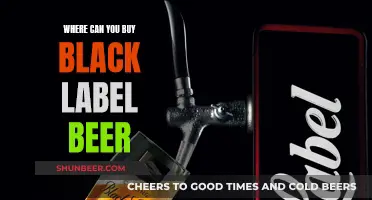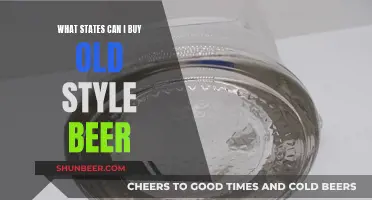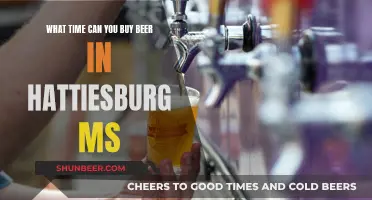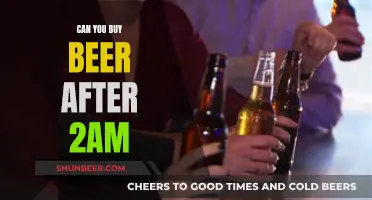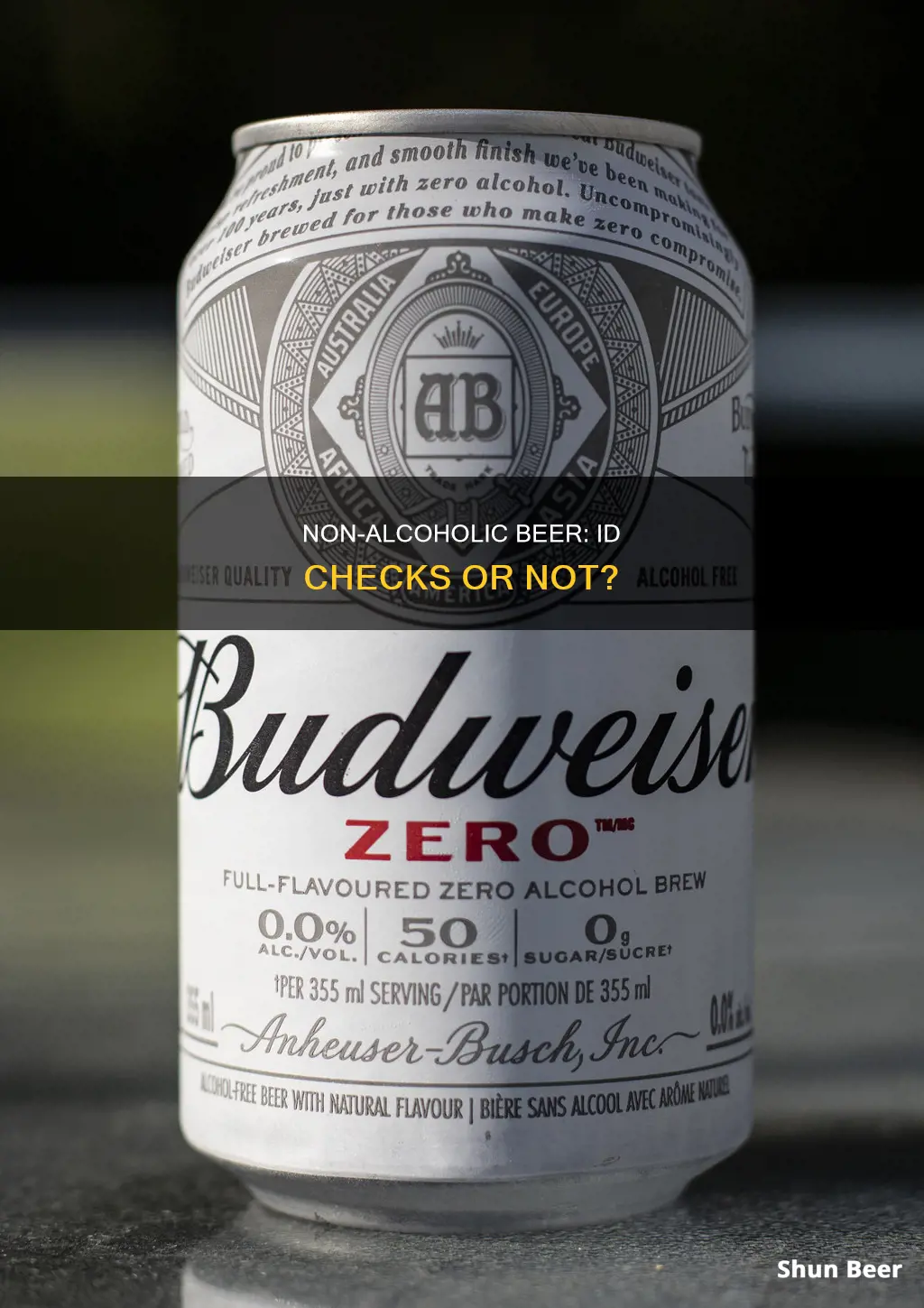
Do you need ID to buy non-alcoholic beer? The short answer is: it depends. While non-alcoholic beer typically contains less than 0.5% alcohol by volume (ABV), which is significantly lower than the alcohol content of traditional beer, it is not always alcohol-free. As such, the laws surrounding the purchase of non-alcoholic beer vary depending on the region.
In the United States, for example, the National Minimum Drinking Age Act prohibits the purchase of alcoholic beverages by individuals under the age of 21. However, each state has different definitions of what constitutes an alcoholic beverage, and the laws regarding the purchase and consumption of non-alcoholic beer by minors differ from state to state. In some states, such as Ohio, individuals under 21 are permitted to purchase non-alcoholic beer, while in others, such as Oregon and West Virginia, it is prohibited.
In the United Kingdom, there is no age restriction on the purchase of drinks with an ABV of 0.5% or lower, which includes some non-alcoholic beers. However, individual retailers may have their own policies and choose to restrict the sale of non-alcoholic beer to minors to avoid promoting alcohol to children and to make it easier to enforce rules regarding alcoholic drinks.
So, while non-alcoholic beer may be marketed as a healthier alternative to traditional beer, it is important to be aware of the varying laws and regulations surrounding its purchase, especially for minors.
| Characteristics | Values |
|---|---|
| Do you need ID to buy non-alcoholic beer? | It depends on the country and state laws. In the US, it depends on the state. In the UK, you don't need ID. |
| Why do you need ID to buy non-alcoholic beer? | To avoid promoting alcohol to children and to make it easier to enforce rules regarding alcoholic drinks. |
| Age limit to buy non-alcoholic beer | In the US, the age limit is 21 years old. In the UK, the age limit is 18 years old. |
| Alcohol content in non-alcoholic beer | Non-alcoholic beers contain up to 0.5% alcohol by volume (ABV). |
What You'll Learn

Non-alcoholic beer may contain trace amounts of alcohol
Non-alcoholic beer is often marketed as a safe alternative to alcoholic drinks, and while it does not have the same intoxicating effects as regular beer, it may still contain trace amounts of alcohol. In the United States, beverages containing less than 0.5% alcohol by volume (ABV) are legally defined as "non-alcoholic". This means that non-alcoholic beers can contain up to 0.5% ABV, which is similar to the amount of alcohol found in some fruit juices, breads, and ripe bananas. While this low percentage of alcohol is not enough to cause intoxication, it is important to note that non-alcoholic beers are not completely alcohol-free.
The amount of alcohol in non-alcoholic beer can vary depending on the brand and brewing process. Some classic non-alcoholic beers, such as O'Doul's, have up to 0.4% ABV per serving, while others may be labelled as "less than 0.5% ABV" to account for variables during fermentation. Even big brands like Heineken 0.0, Budweiser Zero, and Guinness 0.0, which market their products as alcohol-free, may still contain trace amounts of alcohol.
The reason non-alcoholic beers may contain trace amounts of alcohol is due to the brewing process. Non-alcoholic beer is typically produced using the same basic ingredients and fermentation processes as conventional beer. However, to remove the alcohol, brewers employ controlled fermentation methods, dealcoholization techniques, or a combination of both. Controlled fermentation involves cutting off the fermentation process early to limit the amount of alcohol produced. On the other hand, dealcoholization methods aim to remove the alcohol from the brew after fermentation. These methods include heating the alcohol to its boiling point, diluting the product, or using vacuum distillation. Despite these efforts to remove alcohol, it is challenging to eliminate every trace, resulting in residual amounts in the final product.
The presence of trace amounts of alcohol in non-alcoholic beer has important implications for certain individuals. For pregnant individuals, the general recommendation is to avoid any alcohol consumption to prevent the risk of fetal alcohol spectrum disorder (FASD). As non-alcoholic beers may contain some alcohol, they are not considered a safe alternative during pregnancy. Additionally, for individuals recovering from alcohol use disorder, even the smell of beer can trigger cravings and increase the risk of relapse. Therefore, it is generally recommended that those in recovery avoid non-alcoholic beers altogether.
While non-alcoholic beer may not be completely alcohol-free, it is still a safer option compared to conventional beer, especially for those looking to reduce their alcohol intake or avoid the negative health effects associated with alcohol consumption. However, it is crucial to understand that "non-alcoholic" does not necessarily mean alcohol-free, and consumers should be aware of the potential presence of trace amounts of alcohol in these beverages.
Best Places to Buy 1919 Root Beer
You may want to see also

Retailers restrict sales to avoid promoting alcohol to minors
In many countries, including the UK and the US, drinks with an alcohol by volume (ABV) of under 0.5% aren't legally considered "alcohol" and aren't subject to the same restrictions as alcoholic drinks. Despite this, retailers often treat alcohol-free beer the same as alcoholic drinks and restrict sales to minors.
There are two main reasons for this:
- To avoid promoting alcohol to minors: Alcohol-free beer may not contain much alcohol, but the packaging and the drink itself are almost indistinguishable from alcoholic beer. Many alcohol-free and non-alcoholic beers are produced by companies that also produce alcoholic drinks. This means that promoting “alcohol substitute” drinks to minors could indirectly promote similar products that do contain alcohol.
- To make it easier to enforce rules regarding alcoholic drinks: The packaging of alcohol-free beer is almost identical to that of beer that contains alcohol. In pubs and bars, treating alcohol-free beer the same as alcoholic drinks helps owners monitor what customers are drinking. In shops, restricting sales of alcohol-free drinks to minors helps prevent staff from accidentally selling alcoholic products to minors.
Retailers are focused on society’s best interests by voluntarily restricting the sale of alcohol-free beer. Their ultimate aim is to protect children from the dangers of alcohol.
Best Places to Buy Vicky Chamoy Beer
You may want to see also

ID requirements vary by state in the US
For example, in California, you will be carded when buying non-alcoholic beer. In Colorado, you can buy non-alcoholic beer if you are underage. In Ohio, you must be over 18 to buy non-alcoholic beer. In Oregon, West Virginia, and Wyoming, you cannot buy non-alcoholic beer if you are under 21. In Alabama, it is not regulated in wet counties, but the "sale" of non-alcoholic beer is prohibited in dry counties.
Additionally, some states allow minors to consume non-alcoholic beverages under certain conditions, such as parental supervision or permission. For example, in Alabama, Louisiana, Mississippi, New Mexico, North Carolina, North Dakota, Ohio, Oklahoma, Oregon, West Virginia, and Wyoming, minors are permitted to consume non-alcoholic beverages with parental permission or in the presence of a parent or guardian.
The variation in state laws and retailer policies makes it essential to know the local regulations and retailer's policies before attempting to purchase non-alcoholic beverages as a minor.
The Best Places to Buy New Glarus Beer
You may want to see also

Non-alcoholic beer packaging is similar to alcoholic beer
In many places, non-alcoholic beer is treated the same as alcoholic beer by pubs, bars, and shops. This means that non-alcoholic beer is often not sold to those who cannot prove they are of legal drinking age. This is because, despite being very low in alcohol content, non-alcoholic beer typically resembles alcoholic beer in terms of its packaging and taste.
The packaging of non-alcoholic beer is almost identical to that of alcoholic beer. This similarity in appearance between the two products makes it difficult for staff in pubs, bars, and shops to distinguish between the two. As a result, many retailers treat non-alcoholic beer the same as alcoholic beer to simplify the enforcement of rules regarding alcoholic drinks and to avoid promoting alcohol to minors.
The taste of non-alcoholic beer is also similar to that of alcoholic beer. Non-alcoholic beer is typically created using the same traditional brewing process as conventional beer, with the main difference being that non-alcoholic beer is advertised as a beverage that does not contain alcohol. While non-alcoholic beer may be labelled as having 0.0% ABV, it often contains trace amounts of alcohol, with most non-alcoholic beers containing up to 0.5% ABV.
Due to the similarities in packaging and taste between non-alcoholic and alcoholic beer, many retailers choose to restrict the sale of non-alcoholic beer to those of legal drinking age. This helps to avoid any potential confusion or mix-ups that could result in alcohol being sold to minors. While this may be frustrating for those who are of legal drinking age but do not have ID, it demonstrates the commitment of retailers to prioritize the safety and well-being of their customers.
Buying Beer at Maryland Gas Stations: Is It Possible?
You may want to see also

Retailers may restrict sales to simplify rules enforcement
In many pubs, bars and shops, alcohol-free drinks are treated the same as alcoholic drinks. This means no service to anyone who can't prove they're of legal drinking age. There are two main reasons for this: to avoid promoting alcohol to children, and to make it easier to enforce rules regarding alcoholic drinks.
Retailers restrict the sale of alcohol-free beer to make it easier to enforce rules regarding alcoholic drinks. While alcohol-free beer does contain some alcohol, this is not why retailers restrict its sale. In most regions, including the UK and many US states, drinks under 0.5% ABV aren't legally considered "alcohol" and aren't subject to the same restrictions as alcoholic drinks. Everyday foods and drinks such as ripe bananas and bread contain similar amounts of alcohol and they're not restricted.
However, the packaging of alcohol-free beer is almost identical to that of alcoholic beer. This isn't much of an issue in shops, where point-of-sale systems can flag up the differences between alcohol-free and alcoholic beer for staff. But it can be an issue in pubs and bars, where owners are responsible for what people drink on the premises. In these settings, it makes sense for them to treat alcohol-free and alcoholic drinks the same to monitor what customers are drinking. For example, the UK pub company Wetherspoon doesn't sell alcohol-free beer to minors because "it can be difficult for staff to distinguish between customers who are drinking alcohol and those drinking non-alcohol products."
Retailers are focused on society's best interests by voluntarily restricting the sale of alcohol-free beer. Their ultimate aim is to protect children from the dangers of alcohol.
Buying Beer After Midnight: What's the Legal Status?
You may want to see also
Frequently asked questions
It depends on where you are. In the US, it depends on the state you're in and the retailer's policies. In the UK, you don't need ID to buy non-alcoholic beer. However, many pubs, bars, and shops treat non-alcoholic drinks the same as alcoholic drinks, so they won't sell them to minors.
Non-alcoholic beer does contain a small amount of alcohol (up to 0.5% ABV). However, this isn't why retailers restrict the sale of these drinks to minors. They do so primarily to avoid promoting alcohol to children and to make it easier to enforce rules regarding alcoholic drinks.
In the US, the laws vary by state. In some states, minors can drink non-alcoholic beer with parental permission or in the presence of a parent or guardian. However, they cannot purchase it themselves. In the UK, minors can drink non-alcoholic beer, but they need parental permission and a parent or guardian must be with them.


